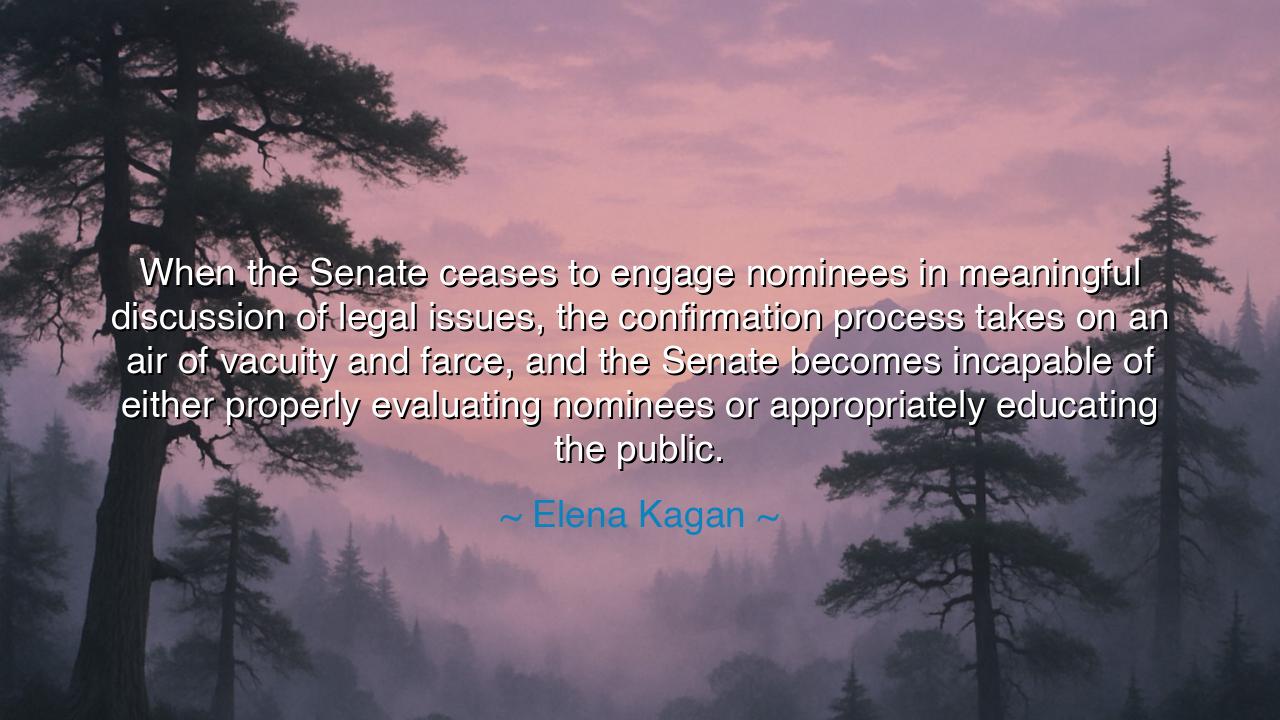
When the Senate ceases to engage nominees in meaningful
When the Senate ceases to engage nominees in meaningful discussion of legal issues, the confirmation process takes on an air of vacuity and farce, and the Senate becomes incapable of either properly evaluating nominees or appropriately educating the public.






Hear the words of Elena Kagan, spoken before she herself would ascend to the nation’s highest bench: “When the Senate ceases to engage nominees in meaningful discussion of legal issues, the confirmation process takes on an air of vacuity and farce, and the Senate becomes incapable of either properly evaluating nominees or appropriately educating the public.” These words strike like a bell, sounding both warning and lament. For they call out the danger of hollow ritual, when solemn duties are reduced to empty theater, and the guardians of justice forget their sacred task.
When Kagan speaks of meaningful discussion of legal issues, she calls to mind the Senate’s ancient role in the confirmation of judges. It is not a ceremonial nod, nor a stage for mere partisanship. It is meant to be an inquiry—a testing of the nominee’s understanding of law, their fidelity to the Constitution, their ability to wield justice without fear or favor. To abandon this duty is to strip the process of its purpose, leaving only spectacle where substance should dwell.
The phrase “vacuity and farce” is a condemnation of pretense. Vacuity—the emptiness of words without thought, of questions without depth. Farce—the mockery of what should be noble, reduced to performance for political gain. Kagan warns that when the Senate plays at justice without seeking truth, the entire process becomes hollow. The people, who look to these hearings to learn the principles that govern their courts, are left instead with noise, distraction, and little understanding of the law that shapes their lives.
History provides us an example in the confirmation of Robert Bork in 1987. His hearing was filled with fiery rhetoric, fierce partisanship, and political theater. Yet buried beneath the spectacle was real engagement—debates about privacy, civil rights, and the limits of judicial power. The nation learned through that process, even if the nominee was ultimately rejected. Compare this with later hearings, where nominees often spoke in vague generalities, and senators seemed more interested in soundbites than substance. Here, Kagan’s lament takes form: the people learn nothing, the Senate gains nothing, and the confirmation becomes a stage play rather than a safeguard of justice.
The deeper meaning of her words is this: a democracy cannot survive on ritual alone. Its institutions must live, breathe, and teach. If those entrusted with solemn duties treat them as performance, the people grow cynical, the process grows brittle, and faith in governance dissolves. The confirmation of judges is not only about choosing one individual, but about revealing to the people the standards by which justice itself is measured. Without transparency and depth, the bond between the people and their laws is weakened.
Kagan’s teaching is not only a rebuke but a call to courage. Senators must not fear difficult conversations about the Constitution. Nominees must not hide behind evasions that reduce answers to shadows. Both must recognize their responsibility to history, to truth, and to the citizens who will live under the rulings of those chosen. To shrink from this task is cowardice; to face it with honesty is the mark of a republic worthy of endurance.
Children of tomorrow, let this wisdom be etched in your minds: when you hold responsibility, do not reduce it to theater. If you are given the duty to question, then question with depth. If you are called to answer, then answer with honesty. In your communities, in your governments, in your families, let not solemn duties be swallowed by farce. For when form replaces substance, corruption creeps in, and the people lose their trust.
Thus, the wisdom of Elena Kagan’s words endures: that the Senate must be more than a stage, the confirmation process more than a show, and the people more than an audience. Let this teaching guide all who bear public duty: seek truth, engage deeply, and remember always that justice, like the nation itself, is sustained not by empty ritual, but by courage, wisdom, and integrity.






AAdministratorAdministrator
Welcome, honored guests. Please leave a comment, we will respond soon